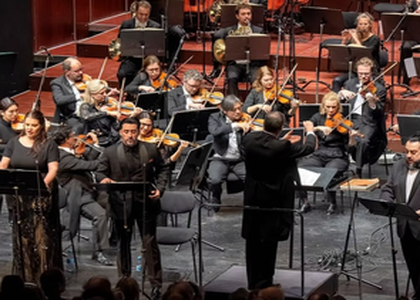> Events

Verdi's Ernani from Munich: Renowned Interpretations of Opera
Renowned Interpretations of Opera returns this Sunday, June 16th, 2024, with a new recordingfrom the 2023-2024 Euroradio Season. This time, we will listen to a concert performance of Giuseppe Verdi's Ernani, recorded on November 26th, 2023, at the Prinzregententheater in Munich. The cast featured some of the most renowned voices of the moment-tenor Charles Castronovo (artist in residence with the Munich Radio Orchestra this season), baritone George Petean, bass Ildebrando D'Arcangelo, and soprano Selene Zanetti. The opera singers were joined by the Bavarian Radio Choir and the Munich Radio Orchestra, conducted by Ivan Repu¹iæ.
In 1844, just two years after the success that brought Verdi fame-Nabucco staged at La Scala in Milan-the Venetians enjoyed the first opera written by the composer for Teatro La Fenice. This was Ernani, based on Victor Hugo's play of the same name. The libretto is by Francesco Maria Piave, who was to become one of Verdi's closest collaborators, with whom the composer would later write La Traviata. Hugo's play was published in 1830 and was very successful; the story centers on Elvira, courted by no less than three men-her lover Ernani, a nobleman turned bandit, her guardian, the old and rich de Silva, and the King of Spain himself, Don Carlo. From a musical point of view, this is not the classic tenor-soprano couple opposed by a baritone. Here, Verdi had the opportunity to explore the timbre and expressive qualities of the three types of male voices. The role of the young, suffering lover, Ernani, is entrusted to the tenor; the baritone takes on the role of Don Carlo, who oscillates between tenderness and violence, between self-pity and idealism, while the bass is the old, selfish, and cruel de Silva. Ernani was an immediate success, becoming one of Verdi's most beloved creations-at least until the score of Il trovatore appeared.
George Petean proves once again to be a significant presence in the opera world. Born in Cluj-Napoca, the baritone graduated from the "Gheorghe Dima" Music Academy-the vocal studies department-and continued his studies with Vicente Sardinero and Giorgio Zancanaro. He made his debut in 1997 on the stage of the Cluj-Napoca Opera as the title role in W. A. Mozart's opera "Don Giovanni," and has since performed roles such as Malatesta in G. Donizetti's "Don Pasquale," Silvio in R. Leoncavallo's "Pagliacci," Valentin in Ch. Gounod's "Faust," Figaro in G. Rossini's "The Barber of Seville," Marcello in G. Puccini's "La Bohème," Ford in G. Verdi's "Falstaff." In 1999 he won the grand prize at the "Hariclea Darclée" International Voice Competition in Brãila. His international debut took place in 2000 on the stage of the Rome Opera in G. Puccini's "La Bohème," and from 2002 to 2010 he was a permanent soloist at the Hamburg State Opera. Throughout his career, George Petean has been invited to perform roles such as: "The Barber of Seville" at the Vienna State Opera, "Faust" by Ch. Gounod at the Metropolitan Opera, "La Bohème" by G. Puccini at the Liceu Opera in Barcelona and the Royal Opera HouseCovent Garden in London, "The Duke of Alba" by G. Donizetti at the Flemish Opera, "Don Carlo" by G. Verdi at the Vienna State Opera, "Traviata" at the Hamburg, Zurich and Vienna State Operas, "Rigoletto" at the Hamburg and Zurich Operas, "Attila" at the Theater an der Wien and La Scala in Milan, "Lucia di Lammermoor" at the Berlin State Opera and the Paris Opera. Soon, the Romanian baritone can be seen and heard performing the role of Giorgio Germont in productions of Traviata staged by the Bavarian State Opera in Munich.
Translated by Alina-Gabriela Ariton,
University of Bucharest, Faculty of Foreign Languages and Literatures, MTTLC, year I
Corrected by Silvia Petrescu














